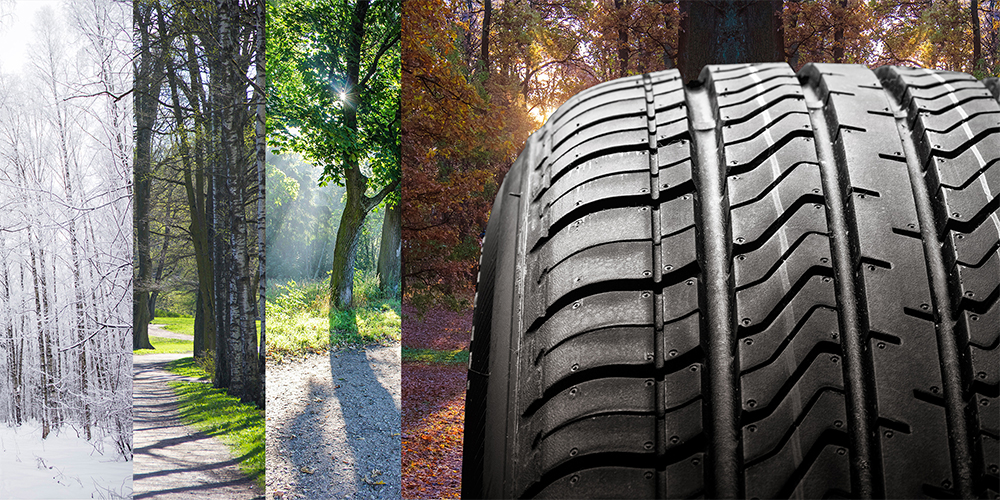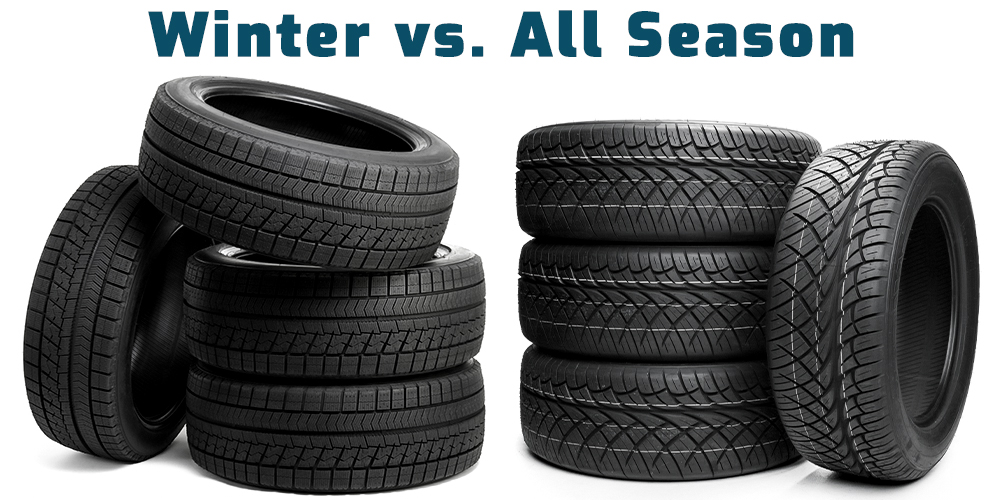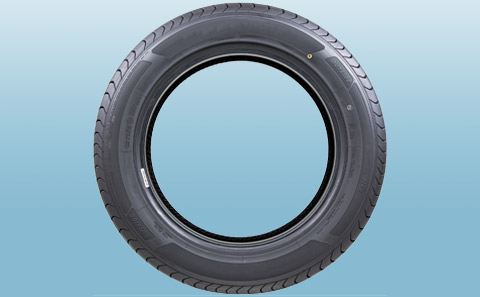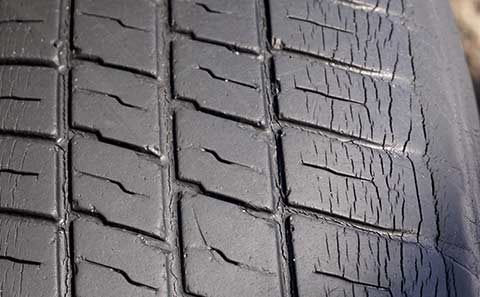When you see all the different types of tires, it is always tempting to pick all season tires. Even if it costs a bit more, at least you don’t need to buy another set of winter tires later on, right? Do all season tires work in snow or is it better to own two tire sets and switch them depending on the road and weather conditions?
It really depends on the climate, the road conditions in your area, your vehicle, and your driving habits. Here at TireMart.com, we are going to show you what all season tires have to offer.
We are also going to compare them to other tire types to clarify what is an all season tire and why you should buy a complete set.
What are All Season Tires?
It all started with Goodyear all season tires, which the company introduced back in the 1970s. They have basically lifted the burden of having to change tires when the weather turns cold. The innovative tread compound and tread design made people able to use tires that perform well in most road and weather conditions.

You can think of all season or A/S tires as jacks of all trades. They are not a good substitute for summer tires or winter tires, although they offer plenty of decent characteristics.
This is not to say that you can’t find the best all season tire for snow. Some models are better for winter, while others perform better during the summer seasons. Nevertheless, when it comes to how long tires last, all season tires are unbeatable
Below, we are going to talk about the main benefits so that you can better understand what are A/S tires exactly.
What Does A/S Mean on a Tire?
“How to know if my tires are all season?” is a common question among drivers who are not tire experts. All season tires are the most used tire for a car in America. These tires fit a wide range of vehicles, such as passenger cars, SUVs, CUVs, light trucks, vans, and, EVs.
For those who ask “How to know if tires are all season?”, just look for the A/S symbol. The A/S symbol on a tire means that they are all season. All season tires are designed to easily perform throughout the year. They can handle various moderate weather conditions. So, if you don’t know how to tell if you have all season tires, this is the main indicator.
How to Identify All Season Tires?
It’s really difficult to choose the right tires for your vehicle. You have to consider driving and weather conditions and also what performance you need. Let’s go through some ways to identify all season tires.
All season tires have balanced tread depths, with wide grooves, siping details, and optimized tread elements. The all season compound is engineered to maintain flexibility from warm summer to cold winter temperatures.
The Main Benefits of All Season Tires
We can safely say that you can expect a decent performance from them in all seasons. Given that you choose a tire of respectable quality, of course. All season tires are designed to excel in wet conditions and to offer year-round pliability.
Many A/S models are designed with driving comfort in mind, guaranteeing a quiet ride. However, they are not the best when it comes to summer and winter conditions.
While evaluating all benefits and inherent limitations, we came to the following conclusions:
- Detailed tread patterns are designed to deal with wet surfaces by channeling water away from the tire’s contact patch.
- Good traction even below 45 degrees Fahrenheit.
- Longer tread life than what season-specific tires have to offer – somewhere around 60,000 miles with good maintenance.
- Engineered for a wide range of vehicles including SUVs, passenger cars, and minivans.
- Versatile tread compounds for mixed terrain types and weather conditions.
Winter Tires vs. All Season Tires
The all season tire vs. winter tire debate is quite simple. Most importantly, winter tires are designed to perform well under 45 degrees Fahrenheit, while all season ones cannot go below freezing temperatures. A good snow tire improves traction on both ice and snow, guaranteeing a safe driving experience during that cold season.
There are significant differences in the rubber blend as well. A snow tire adapts to the cold temperature by maintaining its flexibility. All season tires are engineered to cover a wider range, including hot and cold temperatures, but not the extremes.
The tread design allows the winter tire to bite into the snow and ice, ensuring seamless handling and better traction for the driver. Moreover, you can buy studded or studdable ones that come with metal studs, increasing slip prevention.
Can All Season Tires Be Used in Winter?
All season tires manage to withstand cold temperatures and light snowy conditions. So, will all season tires work in snow?
Well, it depends. All season tires can be used in light winter conditions, but if in any case, the weather becomes harsh, these tires won’t be able to handle snow-covered roads.
Compared to all season, winter tires have a better grip on the road in snowy conditions and also prevent snow build-up along the tread area. Winter tires have more biting edges and a lot of sipes, which enable their safer performance.
However, all season tires are not meant for severe winter conditions. Some all season tires can’t even have close contact and a strong grip on the road in light snowy weather. If you want a safe driving experience, don’t choose all season tires for winter driving.

Are All Season Tires Good for Snow?
First off, all season tires are definitely not ideal in temperatures below 45 degrees Fahrenheit, but their compounds can handle it. Yet, even the best all season tires have difficulties in freezing cold weather. Keep in mind that they have to perform during summer as well. This means that their tire patterns differ from the ones specifically designed for winter.
With all season car tires, you can drive confidently in light snow for sure. In deeper snow, on the other hand, you need to drive carefully for your own safety. In that case, you are better off with a set of winter tires.
The Difference between All Weather and All Season Tires
When it comes to all weather vs. all season tires, there are some important differences to note. Although you can find some pretty good all season tires for snow, all weather tires are still better in that regard. The thing is that their tread compound remains flexible in the cold temperature. It actually offers a safe braking distance and better handling that can potentially prevent accidents.
All season tires come with rubber compounds that harden in response to the cold temperature. The colder it gets, the more unsafe it becomes to drive your vehicle. To summarize, a set of all weather tires is going to give you peace of mind during a snowstorm, while a set of A/S ones will not.
Besides that, they are pretty much the same. You can buy the right tires just by matching them to the average winter weather conditions in your area.
Do All Weather Tires Work in Snow?
The answer is yes, all weather tires work well in snow. These tire types are manufactured to handle even ice- and snow-covered surfaces. In other words, with this type of tire, cars manage to easily control the temperature changes between seasons.
All weather tires are marked with three mountain peak and snowflake symbols, which means that they are designed even for severe winter conditions. They are all season tires with extra grip in winter weather. As a result, all weather tires guarantee a safer driving experience even on ice- and snow-covered roads.
What to Expect from All Season Performance Tires?
If you want to get the most speed and agility out of your sports car, it is best to buy a set of summer tires. Dedicated tires are always better for performance. They offer the braking, cornering, and overall maneuverability needed for better driving safety.
The thing about performance all season tires is that they don’t offer the high-end characteristics you need. If you want to mercilessly step on the gas pedal, then you need to invest in season-specific performance tires. With the all season ones, you really need to know your limitations.

Frequently Asked Questions
How Long Do All Season Tires Last?
The average all season tire can last about 60,000 miles if taken proper care of. Maintenance plays a huge role in the tire’s lifespan. Seasonal tires or terrain-specific ones usually have a shorter service life. This puts A/S models on the top of the food chain with a longer tread life.
Are All Season Tires Good in Snow?
All season tires are not designed for deep snow or ice-covered roads. In harsh winter weather, slow to moderate speed is recommended with careful steering. The tread pattern provides good traction on light snow and in unexpected winter storms. They are not suitable for freezing temperatures.
Should You Own a Set of Snow Tires?
Using all season tires in snow is only recommended in light snow. In areas where deep snow is common during winters, it is better to use snow tires. They are designed for safe winter driving conditions, with a detailed tread pattern and a rubber compound that adapts to freezing temperatures.


